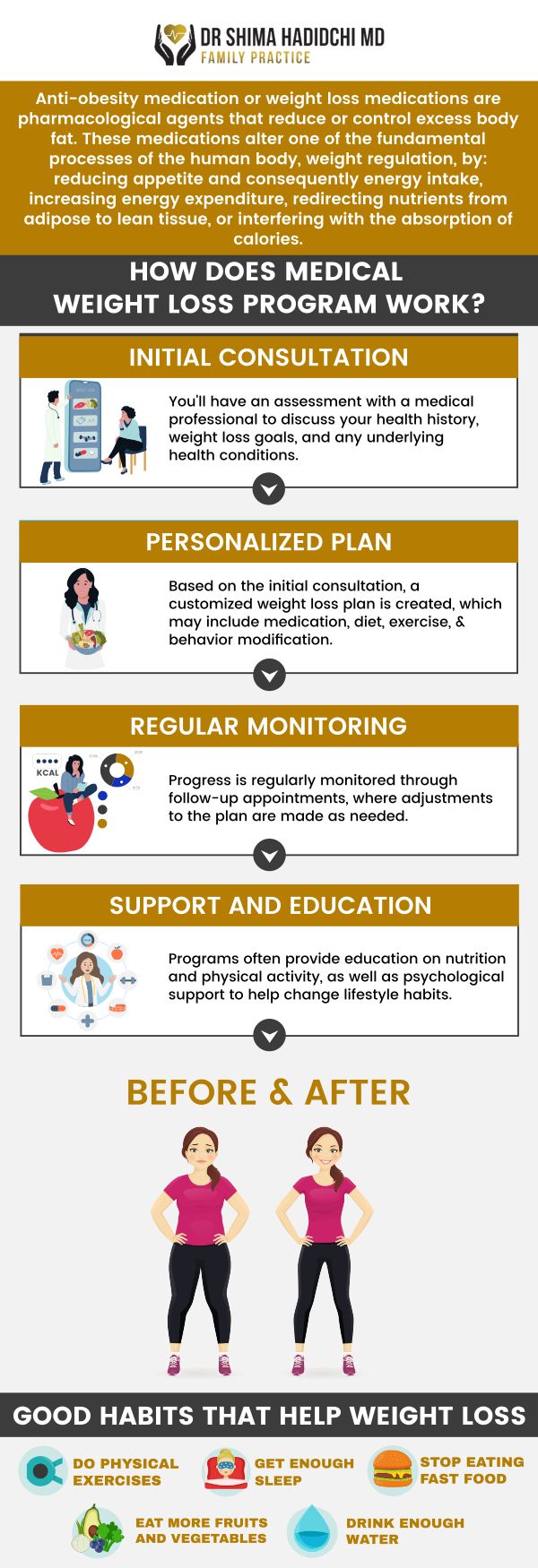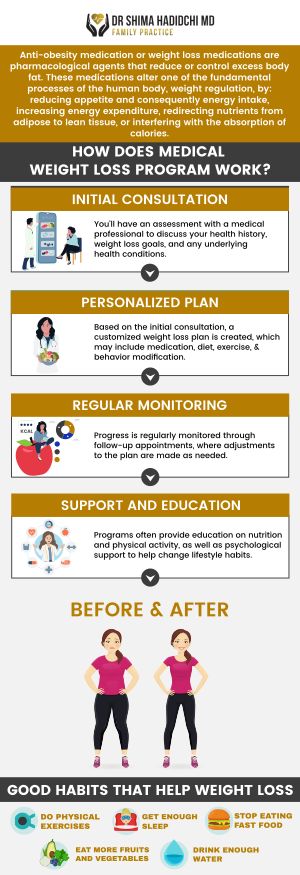Weight Loss Resistance: What Is It?
Losing weight is a gradual process that requires consistency and patience. Making healthy lifestyle choices, such as maintaining a balanced diet, regularly exercising, sleeping well, and controlling stress, can support weight loss efforts and help you overcome weight loss resistance. If you’re still having trouble losing weight despite your best efforts, talking to a weight loss specialist is recommended. Visit Dr. Shima Hadidchi MD Family Practice today to get specialized and quality care. For more information, contact us today or schedule an appointment online. We have convenient locations to serve you in Apple Valley, CA and Victorville, CA.




Table of Contents:
What is weight loss resistance?
Why is it so hard to lose weight but easy to gain?
How long does the body resist weight loss?
How do you break weight loss resistance?
Weight loss resistance refers to difficulty losing weight despite significant efforts. Many people are affected by this frustrating and demotivating condition. There are a variety of causes for weight loss resistance, including underlying medical conditions like hypothyroidism, insulin resistance, and hormonal imbalances. Other causes include medication side effects, insufficient sleep, chronic stress, and poor diet choices. Genetic predisposition may also play a role in weight loss resistance. Treatment for this condition often consists of dietary changes, exercise programs, medication adjustments, stress management, and other lifestyle modifications.
There are several reasons why losing weight is often more difficult than gaining it, including:
• Psychological factors – People eat for reasons other than hunger, such as stress, boredom, or social occasions. These habits can be difficult to break, making weight loss harder.
• Inactive lifestyle – Sedentary lifestyle factors make it harder to lose weight. It is common to spend a lot of time sitting in many professions. This often leads to weight gain and makes it difficult to lose weight.
• Food options – It is easy to overeat and gain weight due to the many unhealthy options available. The food market is saturated with processed, high-calorie and high-fat foods that are attractive and addictive.
• Biological factors – As a survival mechanism, our bodies are programmed to store energy as fat. This means that our bodies are predisposed to keep fat, which makes it difficult to lose weight.
• Metabolic adaptation – The body’s metabolic rate may decrease in response to lower calorie intake when weight loss is attempted. This can make it challenging to continue losing weight, as the metabolism has adjusted to the lower intake.
Variables such as starting weight, diet, exercise routine, and underlying medical conditions affect how long the body resists weight loss. The body typically resists weight loss for a few weeks to several months. Furthermore, weight loss resistance can be caused by underlying medical conditions or medications. In some cases, genetic factors also play a role.
Due to water weight loss, individuals often experience rapid weight loss when beginning a weight loss program. After this initial phase, weight loss may slow or plateau. After this, the body may resist further weight loss. This commonly occurs as a result of metabolic adaptations, in which the body reduces its metabolic rate in response to a lower calorie intake. This adaptation makes it harder to burn calories and lose weight.
Losing weight is a gradual process that requires consistency and patience. Making healthy lifestyle choices, such as maintaining a balanced diet, regularly exercising, sleeping well, and controlling stress, can support weight loss efforts and help you overcome weight loss resistance. If you’re still having trouble losing weight despite your best efforts, talking to a weight loss specialist is recommended.
There are several techniques to overcome weight loss resistance, such as:
• Consider your diet – Review your current diet and ensure it is nutrient-rich, balanced, and supports your weight loss objectives. Avoid processed and high-calorie foods and focus on whole foods like fruits, vegetables, whole grains, lean protein, and healthy fats. A dietitian can provide you with individualized nutrition advice.
• Increase your physical activity – Staying active helps you lose weight by increasing your metabolism. It is recommended to complete at least 150 minutes of moderate-intensity exercise each week, or as directed by your healthcare provider.
• Be persistent and patient – Weight loss is a gradual process that requires motivation, persistence and patience. Celebrate accomplishments and keep your focus on healthy routines and long-term goals.
• Visit the doctor – Medical conditions such as thyroid dysfunction, insulin resistance, and hormonal imbalances can be the reason you’re struggling to lose weight. It’s important to identify any underlying medical conditions and have them treated.
Dr. Shima Hadidchi MD provides nutritional counseling, exercise programs tailored to each patient’s needs, medication management, weight management programs, and educational resources designed to help make healthy lifestyle changes that can lead to better health. For more information, contact us today or schedule an appointment online. We have convenient locations to serve you in Apple Valley, CA and Victorville, CA. We serve patients from Apple Valley CA, Victorville CA, Spring Valley Lake CA, Hesperia CA, Baldy Mesa CA, Mountain View Acres CA, Adelanto CA, and surrounding areas.

Check Out Our 5 Star Reviews


Additional Services You May Need
▸ Telemedicine
▸ Family Practice And Primary Care
▸ Walk-Ins
▸ Weight Loss Management
▸ Zepbound for Weight Loss
▸ Women’s Health
▸ Vaccinations & Immunizations
▸ Diabetes Management
▸ Geriatrics
▸ Pediatrics
▸ Internal Medicine
▸ Acne Treatment
▸ Cryotherapy Treatment
▸ Skin Lesion Removal
▸ Dementia Treatment
▸ Semaglutide GLP-1 Injections

Additional Services You May Need
- Telemedicine
- Family Practice And Primary Care
- Walk-Ins
- Weight Loss Management
- Zepbound for Weight Loss
- Women’s Health
- Vaccinations & Immunizations
- Diabetes Management
- Geriatrics
- Pediatrics
- Internal Medicine
- Acne Treatment
- Cryotherapy Treatment
- Skin Lesion Removal
- Dementia Treatment
- Semaglutide GLP-1 Injections








